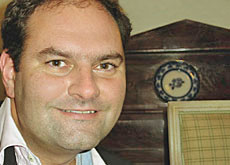bringing a touch of luxury to the world

After six challenging years in four locations outside Switzerland, luxury hotelier Marc Aeberhard has no urge to return home.
A problem-solver, he’s in his element when the launch of a new hotel isn’t going to plan and needs work to turn it around.
“All the things I used to complain about when I lived in Switzerland, I enjoy now,” Aerberhard admits.
“You make peace with Switzerland,” he says, half-joking, half in earnest. “A trip to the Swiss embassy becomes a pilgrimage to the Swiss flag,” he reminisces about his time in Thailand.
“And when the chargé d’affaires opens another bottle of chilled Fendant, all is well with the world. Especially in Bangkok, when the smell of freshly fried locusts is drifting up from the alleyway below.”
Aeberhard, a business economist from Bern University and qualified hotelier from the well-known Lausanne Hotel School,
spent his first ten years as a child in Tehran, because of his father’s work. “A sort of misty-eyed vision of home remains with me from this time.”
Opening specialist
In the hotel and tourism industry, Aeberhard has earned himself a name as a hotel launcher, a so-called opening specialist. “Opening hotels is my kick,” he says.
“In the early days the procedures are not yet in place. A year later the running of the business has become routine and that’s often boring for me.”
The opening phase carries risks. In Thailand, to enhance the quality of
service, he organised a wine tasting for the waiting staff to get to know the international wine list.
“It was a total fiasco. After a few slugs of wine, they were all giggling away to themselves. We had to stop the wine tasting straight away, otherwise we would have had to shut the hotel for the rest of the day.”
In the Maldives, the hotelier was faced with more tricky problems. “The holiday resort was spread over 1.5 kilometres – a row of luxurious huts on stilts, with just one central kitchen on the main island.”
In this climate even the freshest salad wilted, transported over such a distance. And every cutlet became mushy, especially during
the monsoon season when there was warm rain, Aeberhard discovered.
Using his Swiss creativity, he transformed an old aluminium boat into a floating kitchen.
“Because of the ebb tide, the boat couldn’t have a depth gauge. We only found this out later when we hit the sand and nearly tipped over while cooking.”
Tsunami
Last Spring, Aeberhard took over the rebuilding of the island hideaway of the tsunami-hit Dhonakulhi, also in the Maldives.
“Not only had the staff deserted the area, there was also a lot of
bad blood because of the aid organisations and the government,” he said.
A jumbo jet full of Wellington boots, wool blankets and anoraks was delivered – to islands with a constant temperature of 30 degrees.
To this day, there is a shortage of building materials, wood, corrugated iron, tools and cement.
“I want to tap into the quality Swiss hotel tradition that died out 50 years ago,” Aeberhard says. But he doesn’t see “Swissness” as simply plonking a Swiss chalet in the Dubai sand.
His idea is much more about passing on certain Swiss qualities in
expertise, business sense and organisation.
Aeberhard is most excited about the creation of luxury services in developing countries and finds it a privilege to be part of this up-and-coming sector.
Hotel management is still in its infancy in many countries. This means plenty of opportunities for Aeberhard to apply his passion and know-how to the aspirations of new hotels around the world.
swissinfo, Alexander Künzle
Marc Aeberhard’s Swiss definition of luxury:
Luxury cannot be achieved by exquisite surroundings alone.
Luxury comes from the special services that make life more comfortable for clients. It’s about taking the time and trouble.
Luxury is the combination of bespoke service, organisation and the friendliness of the welcome.
Aeberhard’s career as openings-specialist in the luxury hotel sector:
Opening and market entry of Switzerland’s smallest five-star hotel, the Stadthaus in Burgdorf (average room price SFr250).
One year in Thailand, Amari Hotels (SFr120), 2 years in the Maldives, Soneva-Gili island resort (SFr800), 1 year in the Thalassa Spa Hotel, Cyprus (SFr600).
Rebuilding of the island hideaway, Dhonakulhi in the Maldives, destroyed by the southeast Asia tsunami.

In compliance with the JTI standards
More: SWI swissinfo.ch certified by the Journalism Trust Initiative
You can find an overview of ongoing debates with our journalists here . Please join us!
If you want to start a conversation about a topic raised in this article or want to report factual errors, email us at english@swissinfo.ch.